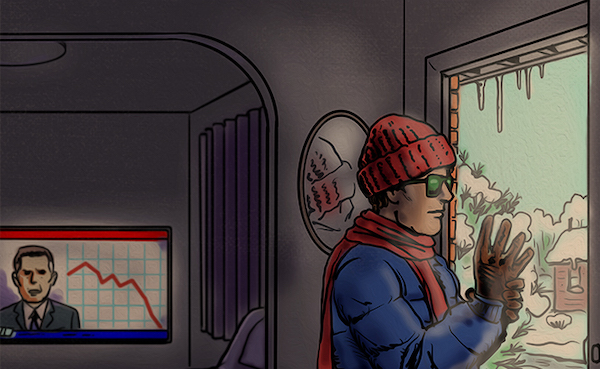
We’ve all been there. The guy in the cubicle next to us makes lewd jokes seemingly on a daily timer. One of the gals in sales clearly doesn’t do her part and leeches on the work of others. A fella on your team has taken credit for your great idea that’s now being implemented. In any work situation, you’ll almost always have at least one person you don’t really get along with. Given how much time we spend at work, having a bad coworker can really hamper your mood over the long haul, as well as your job performance. How you deal with that conflict could very well be the difference between having a good job and having a bad job. In my own experience, the environment — including the people you work with — often makes a bigger difference in how you see your job than the work itself. For that reason, it’s incredibly important to know how to deal with bad coworkers.
Below are some tips to do so. Treat it like a flow-chart: start with the first couple options which are introspective and low-risk, then work your way to addressing the bad coworker one-on-one, to finally, as a last resort, approaching your supervisor.
Accept and Acknowledge Personality Differences
When you spend 8+ hours per day, 40+ hours per week with someone — and in many cases a whole team of people — it’s likely that they’re eventually going to rub you the wrong way. Small tics will be magnified and personality differences lead to varying work styles, which can easily turn into conflict. Perhaps you work fast and efficiently, but sometimes miss details; you might clash with the fellow who works a little slower than you, but tends to get it all right on the first go. Conflict can even arise from something as simple as you desiring a quiet lunch period, while your coworkers like to socialize. These types of things are simply differences in how you work or socialize, and don’t necessarily make your coworkers bad.
A helpful way to spot these differences is to take a personality test as an office. You can suggest to HR or your supervisor that everyone take an assessment so that you all can discover your differences in work habits, learning styles, etc. Simply understanding those unique traits of your coworkers will go a long way in quelling conflict, as you’ll be better able to both empathize and ensure that small tics aren’t blown up in your mind.
If doing an office assessment isn’t possible, do some research on your own regarding personality types and strengths/weaknesses. StrengthsFinder is a great resource that outlines the benefits and drawbacks of 34 different “talent themes.” While generally taken as a personal resource, you can read through all of the strength categories and identify where you think people land, which will help in your dealing with them.
Know the Pros and Cons of the Work Culture
In addition to understanding your co-workers varying personalities, it’s also important to know the culture of the workplace. In a sales environment where folks are competing for commissions and bonuses, it’s understandable that not everyone would be over-the-top friendly with each other. You should consider whether you might be misinterpreting behavior or overreacting to it.
In high-stakes tech companies like Microsoft and Apple, the work culture is notoriously demanding and competitive, which can obviously lead to a lot of conflict. A prickly Steve Jobs isn’t really going to care that your feelings got hurt in a meeting. In that situation, you may just realize the benefits of the job outweigh dealing with your manager’s occasional outburst or the feeling of being slighted.
Those situations can be helped by having some good coworkers that are on your side and will support you. Having 2-3 people you really like and get along with will in many cases override the annoyances of a bad coworker.
There are pros and cons to any job; one bad apple on a team may not be enough of a problem to really get under your skin in a way that affects your work. On the other hand, one bad apple on a small team or who sits right next to you can make life hell. So next we’ll look at some strategies for handling that conflict.
Kill ‘Em With Kindness
Researcher Nathanael Fast argues that most workplace conflict arises because people’s egos are threatened. Our work is directly connected to our livelihood; if it’s threatened, we’re likely to lash out, even if it’s in subconscious ways. That acting out can take the form of bullying, underhanded comments, passive aggressiveness, and any number of other behaviors that you find distasteful. So what’s one to do?
Fast suggests offering gratitude. If someone has been short with you, or said something that might have offended you, try being extra pleasant while chit-chatting rather than offering a cold shoulder. Or perhaps you can offer to buy them a cup of coffee the next day, or ask if they’d like to join you for lunch. Your kindness may very well help them realize and be a little ashamed of their own poor behavior, and the situation may not have to escalate to a point of even needing to confront it.
Another way this works is to find at least one thing about that coworker you do like and focus on that rather than the traits that annoy you. Maybe they’re into dogs and you can brag about your pooch to them, or they enjoy craft beer like you do so you can talk about your favorite local watering hole. Find ways to center your conversation on these topics, and perhaps what you disliked about that person will be lessened.
Also be sure to avoid gossiping about the bad coworker. There’s an episode of How I Met Your Mother in which one of the characters, Marshall, is trying really hard to fit in at his new job in a law office. His coworkers are characterized (and dressed up to make the point) as gorillas — ogreish men who make vulgar jokes and demean those around them. At first, Marshall plays along in order to be part of the group, but eventually he turns into a gorilla himself. Only after pulling away from those conversations does he turn back into his kind and hardworking self. It’s a great look at how simply participating in gossip and mean-spirited conversations changes who we are and how we treat people. If you avoid demeaning conversations, it’s possible your annoyance at a certain coworker will fade away.
If after a couple weeks this hasn’t worked (or if the situation is more serious than a somewhat minor annoyance), however, you can try some avoidance techniques.
Try Avoidance Tactics
Finding ways to simply avoid the bothersome coworker is a helpful solution that can possibly nip the problem in the bud without requiring an awkward one-on-one confrontation. While these techniques don’t necessarily solve underlying issues or conflicts, that may not matter much if the problem is out of sight and out of mind. A few strategies to consider:
- Move desks/cubicles. If you’ve got a cubicle neighbor who’s annoying you with their music, smell, constant chit-chat, etc., ask your supervisor to move desks. You don’t have to tell them exactly why you’re making your request — just say it’s too loud/hot/dark/distracting in your general area. If the supervisor probes further, simply state that there’s some conflict between you and a coworker that’s hindering your productivity.
- Rearrange your schedule. If problems seem to arise only during a certain time of day — perhaps your co-workers badger you when you’d like to eat your lunch in peaceful solitude, or congregate by your desk at 4:45 preventing you from finishing your work for the day — the solution may be as simple as rearranging your schedule a little bit. Maybe you can shift your entire workday by an hour or two, or leave the premises to eat your lunch at a park or by yourself at a café — a tactic I’ve used successfully myself.
- Ask about working remotely. If you can work from home a couple days per week, or even simply in the coffee shop a couple blocks from your office, that irksome coworker may not be so irksome anymore.
- Change teams. This tactic is a little more extreme, as it could functionally mean changing your job. One way to approach this tactic is to play it off like you’ve been considering changing teams/departments for a while based on your personal interests/desires. It’s also possible that this option comes into play as a solution only after confronting a coworker.
Resolve the Conflict at the Source
This article could easily be more about conflict resolution than “dealing” with bad coworkers. Most people’s tendency is to avoid conflict, so our first instinct in handling people who annoy us — especially at work — is to complain to our friends/family, complain to the coworkers we do like, complain to HR, complain to your boss, etc. You get the picture. While avoidance tactics can occasionally work as noted above, they’re not always ultimately successful since they don’t address the underlying issue.
Especially if your conflict with a coworker is personal in nature rather than related to the work itself, you may need to approach them directly with whatever your issue is. If they’re cracking inappropriate jokes, tell them that it makes you uncomfortable and you’d prefer that they leave their wisecracks at home. If they’re perhaps giving you crap about being the newbie (and it’s been more than a couple weeks), tell them that you’re learning as fast as you can and that you’d rather not be put down while also trying to fit in at a new work environment.
By not addressing these personal conflicts when they arise, you simply let them fester inside, and then you end up disliking the person far more than you may have had you just brought it up straightaway. In most cases, people aren’t malicious, and they’ll respect your direct approach. In our world of passive conflict, in which arguments are dealt with by posting tweets or sending emails, a real conversation might actually be a breath of fresh air.
If the ribbing or other personal conflict continues, bring it up one more time with them, a little more sternly, and threaten to go up the chain if needed. After that you can go to HR or your supervisor (tips on that below). There are a couple instances in which going to a supervisor or HR should be your first option for personal issues, such as a threat or sexual harassment. Use your best judgment, however, and let your default option be to resolve the conflict at the source.
If the bad coworker is annoying you because of something that’s related to the work rather than personal slights, it can be a different situation which may require going to your supervisor first. In some instances, though, you still might be able to handle it on a personal level. If you’re taking the lead on a group project with a team and someone isn’t keeping up with the work, you can absolutely handle that on your own. If your colleague routinely hops on the phone for a personal call when the boss leaves the office, you can mention that you’ve noticed, and let them know that unless they stop, you’ll be bringing it up to the supervisor.
The Last Resort: Approach the Higher-Ups
Say the conflict has escalated and your attempts at one-on-one resolution haven’t worked. Or maybe the offender isn’t your own supervisor, but is still higher on the food chain than you. Perhaps someone with seniority, but still a peer, seems to have a habit of not quite getting all their work done, and it’s affecting your work as well. There are certainly situations that warrant approaching your boss or HR rep, but as one executive I talked to noted, “It should be the last resort.”
Before you go in to see your supervisor, do an informal poll among coworkers you’re friendly with as to their feelings about the offending party. After you tell your boss about the issue, he or she may ask around to see if others have noticed the problem as well. Knowing that your coworkers will corroborate your story will bolster your confidence and the strength of your case. If you’re the only one who’s noticed the problem, you might consider the possibility that you’ve managed to make a mountain out of a molehill, and that bringing it up with a supervisor will backfire on you.
Once you do decide to approach a higher-up about the conflict, be sure that you’re talking about it in terms of how it’s affecting the business and your performance. Author Gary Namie notes that when you have a boss’s ear, you should focus on how the agitator’s behavior is hurting the business. A more personal plea is unlikely to make a difference, as it often devolves into he-said/she-said arguments. “Don’t tell a story of emotional wounds. Make an argument that the person is costing the organization money.”
If the problem is work-related, your boss likely already knows about it. If it’s someone who is inefficient, or not great to work with on a group project, the cold reality is that the company likely puts up with it because the person excels in other areas and/or it’s too costly to try to replace them. Firing and hiring new people is time and money intensive, and you may simply need to come to that realization as well and do whatever you can to handle those situations with grace.
If the problem is personal in nature, the hope is that your boss would speak with that person about the problem and it would go away, and if the offense is serious enough, let them go. That’s in an ideal world, of course. In a business setting, the bottom line often wins out against feelings. At that point, you simply have to decide if the bad coworker and their behavior is worth the job. If they are, you can follow some of the tips in our article on how to deal with a job you don’t like. If the job isn’t worth it, get started on looking for a new one.
Conclusion
Above all, dealing with a bad coworker most often just means finding a way to avoid it, approaching them one-on-one to address the conflict, or just ignoring it and acknowledging that you simply won’t get along with everybody you come across. Frankly, the options are to deal with it and address it, or leave the job. It’s that simple. And I would certainly recommend the former when possible. In today’s job market, one of the questions that references get asked more than almost any other is if you get along with others. Dealing with bad coworkers is just part of almost any job, as is dealing with difficult and annoying people in all walks of life. You can either complain and mope about it and let those people ruin your day, or can step above it and decide that how your day goes is largely in your own hands.
Do you have experience with bad coworkers? What were your strategies in dealing with them?







